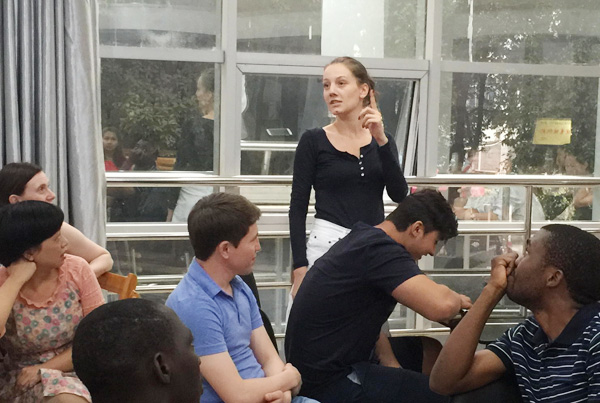 |
|
Foreign students meet their Chinese hosts at a gathering. [Photo provided to China Daily] |
More than 40 foreign students and 16 faculty families at Jiangxi University of Finance and Economics have joined a program created to help newcomers more easily adapt to Nanchang's environment and culture.
The Peer Share Program encourages joint activities every one or two weeks, ranging from cooking Chinese food and celebrating traditional Chinese festivals to games, sightseeing and sports.
Foreign students usually attend classes taught in English and have few chances to interact with Chinese students, so many of them face initial difficulties adjusting to local life, said Liu Feng of the university's International Cooperation and Exchange Center.
"We believe that they come to China not only to learn, but also to experience Chinese culture. We hope the program can help them achieve that goal," Liu said.
Naveed Razzaq, 33, from Pakistan, who is enrolled in the university's business management diploma program, has registered twice for the program. "I liked it very much the first time. So I applied again," Razzaq said.
Razzaq said the program helped him gain better knowledge of Chinese culture, especially family dynamics. "Chinese families have a lot in common with Pakistani ones, except that the food is so different," he said.
After many interactions, including a home visit, Razzaq has established a good relationship with members of his partner family. They even set up a group on WeChat, China's most popular messaging app, to communicate with each other.
"I may still have cultural shock sometimes, but definitely no homesickness," Razzaq said. "They asked me a lot of questions, too, such as things about my family and food in my country. Now they have some understanding of it and look forward to traveling there."
Miao Li, who teaches English at the university, applied for the program after seeing a notice on the university's website. She saw the program as a good opportunity for her to practice spoken English.
The first meeting with her family's two Czech exchange students was like a blind date, she said. "We sat face to face and started introducing ourselves," Miao said.
Each family takes two or three foreign students. Students write their preferences for their families on the back of their photos, and some of the teachers bring their family photo albums and delicious food to the pairing-up meeting in order to attract students.
During the Qingming Festival, also known as Tomb-sweeping Day, Miao took her students on a visit to her hometown, a more than two-hour drive from Nanchang, and stayed there for two days. The students experienced an unforgettable time picking and making tea.
The university started accepting foreign students in the 1990s.
Contact the writers through [email protected].
